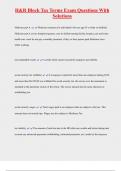H&R Block Tax Terms Exam Questions With
Solutions
Medicare part A Medicare insurance for individuals who are age 65 or older or disabled.
Medicare part A covers hospital expenses, care in skilled nursing facility, hospice care and some
health care. most do not pay a monthly premium, if they or their spouse paid Medicare taxes
while working.
non-refundable credit A credit which cannot exceed the taxpayers tax liability.
social security tax withheld if a taxpayer worked for more than one employer during 2019,
and more than $8,329.80 was withheld for social security tax, the excess over the maximum is
included in the payments section of the return. The excess amount has the same character as
withholding tax.
social security wages Total wages paid to an employee that are subject to this tax. This
amount does not include tips. Wages are also subject to Medicare Tax.
tax liability The amount of total tax due to the IRS after any credits and before taking into
account any advanced payments (withholding, estimated payments, ect.) made by the taxpayer.
,H&R Block Tax Terms Exam Questions With
Solutions
taxable income Adjusted gross income, less itemized deductions or the standard
deduction, less the qualified business income deduction, if applicable. this term is also used to
refer to income that is not exempt or excluded from taxation. example wages equals taxable gifts
equal non-taxable.
unearned income taxable income other than that received for services performed (earned
income). unearned income includes money received for the investment of money or other
property, such as interest, dividends, and royalties. it also includes pensions, alimony,
unemployment compensation, and other income that is not earned.
resident alien a citizen of another country who lives in the US and or has a resident status
by law or visa or passes the substantial presence test. (1040)
non-resident alien A person who is not a US citizen and does not live in the US or lives in
the US under a non-resident visa or does not meet the substantial presence test. (1040NR)
schedules official IRS forms to report various types of income, deductions, and/or credits.
,H&R Block Tax Terms Exam Questions With
Solutions
statements explanations of various types of income, deductions, and/or credits reported on
a schedule or directly on a 1040 form. statements may or may not be official IRS forms.
AGI adjusted gross income
QBI qualified business income
PTIN prepare tax identification number
community income Income of a married couple, living in a community property state, that
is considered to belong equally to each spouse, regardless of which spouse receives the income.
community property Property considered to belong in equal shares to a husband and wife.
This concept of ownership for property acquired after marriage is followed in Arizona,
California, Idaho, Louisiana, New Mexico, Nevada, Texas, Washington, and Wisconsin.
dependent An individual who may be claimed on another person's income tax return. To
be claimed as a dependent, a person must meet the qualifying child or qualifying relative test
, H&R Block Tax Terms Exam Questions With
Solutions
gross income Total worldwide income received in the form of money, property, or
services that is subject to tax.
joint return A return combining the income, credits, and deductions of a married couple,
resulting in a joint tax liability or joint refund.
married filing jointly (MFJ) The filing status used by a taxpayer who is considered
married at the end of the tax year and not legally separated under a final decree of divorce or
separate maintenance agreement. As a result of filing MFJ, the taxpayer(s) record total income
and deductions of both spouses on one tax return.
married filing separately (MFS) The filing status used by a married couple choosing to
record their respective incomes and deductions on separate individual tax returns.
standard deduction A base amount of income not subject to tax. The regular standard
deduction for 2019 is $12,200 for single taxpayers and married persons filing separately;
$18,350 for heads of household; and $24,400 for married couples filing a joint return and
qualifying widow(er)s. Taxpayers who are blind and/or age 65 or older have higher standard




